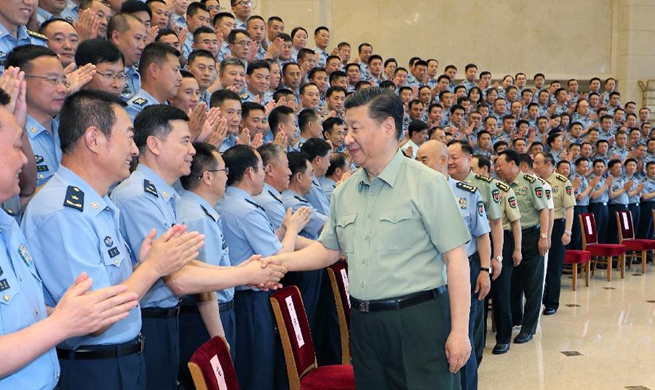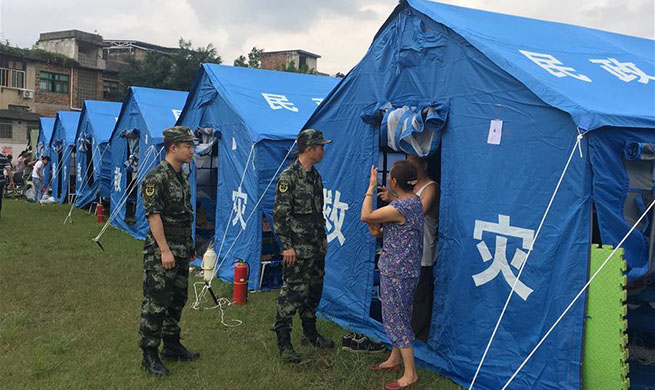NANCHANG, June 19 (Xinhua) -- In November of last year, a patient in Hefei, eastern China's Anhui Province, went to a community health center and was diagnosed with arrhythmia by doctor He Qi. He strongly suggested that the patient undergo coronary angiography at a superior hospital as his AI assistant gave a different diagnosis.
The result showed that the AI was correct. The patient actually suffered from coronary heart disease.
The AI medical assistant, a product launched in March 2018 by China's AI firm iFlytek Co., Ltd, is becoming an important partner for grassroots doctors to make the diagnoses in rural China.
With a strong learning capability, the AI system mastered the knowledge in 53 medical textbooks and 400,000 authoritative medical literature. It passed the written test of the national qualification exam for clinical practitioners with excellent results that beat 95 percent of the 530,000 candidates in August 2017. It is also ceaselessly learning the most up-to-date medical knowledge.
"The application of AI medical assistants has significantly shortened the time and improved the success rate for grassroots doctors to make diagnoses," said He.
According to Tao Xiaodong, CEO of iFlyHealth, after being applied in four counties and a district in Anhui, the AI medical assistant has made more than 1.5 million auxiliary diagnoses. "It can help confirm over 900 diseases at health centers at the grassroots level with an accuracy rate of 97 percent," said Tao.
As of March this year, the product has been applied in almost 1,200 clinics and health centers across the country.
Technology has been reshaping the life of rural Chinese in many ways. The diagnosis and treatment level of clinics and health centers in rural China, especially on and below the county level, have long been relatively low due to lack of experienced doctors and advanced equipment. Therefore patients, especially the critically-ill ones, often have to be transferred to upper-level hospitals.
As China deepens the reform of its medical and healthcare system, a big part of the reformation is to develop a hierarchical medical system to allow patients to have their first diagnoses done at the grassroots level, and now technology has come to help make this a reality.
After being X-rayed, Long Shixiang, 62, is relieved to hear that her broken bone has healed.
A native of Hongtang Town, Yuanzhou District of Yichun City in eastern China's Jiangxi Province, she is more than lucky to receive all her medical treatment at her doorstep.
"It saved me a lot of money and trouble," said Long, who had to stay at home to take care of two granddaughters as both her son and daughter-in-law work out of town.
Just two years ago, it was impossible to get an X-ray at the local health center due to lack of equipment and qualified practitioners.
"The equipment was too outdated to take clear X-rays and there were no doctors capable of giving professional diagnostic reports," said Fu Chunping, head of the local health center. "The patients had to go to the superior hospitals for treatment."
"X-rays play a major role in clinical diagnoses of many diseases, including fractures and various lung and heart diseases," said Chen Junkun, chief medical officer of JF Healthcare. "It also is cost-effective."
The local government purchased X-ray machines for 27 health clinics in the district in 2017, but doctors were still nowhere to be found until technology came to help.
By collaborating with JF Healthcare, a company that specializes in providing online medical service with AI and remote interconnection technology, patients can receive their X-ray reports within 10 minutes. By uploading the X-ray film to a cloud platform, an AI system will conduct an auxiliary diagnosis and the film will later be reviewed by qualified practitioners who will make judgments in 10 minutes.
Now JF Healthcare has partnered with 1,019 grassroots hospitals in 12 provinces and regions including Jiangxi, Xinjiang, Hubei, Hebei, Guangxi and Yunnan. And more than 20 million residents in rural areas can enjoy the service.
By reading the diagnostic reports that are sent back, doctors at the grassroots level can also improve their treatment levels.
"Telemedicine is a new trend to solve the problem of poor access to medical services in rural China, and it is encouraged," said Liu Xiaohui with the provincial health commission of Jiangxi. "The medical treatment at the grassroots level will be quickly improved and the residents in rural areas can enjoy better medical services with the help of AI and other advanced technology."

















